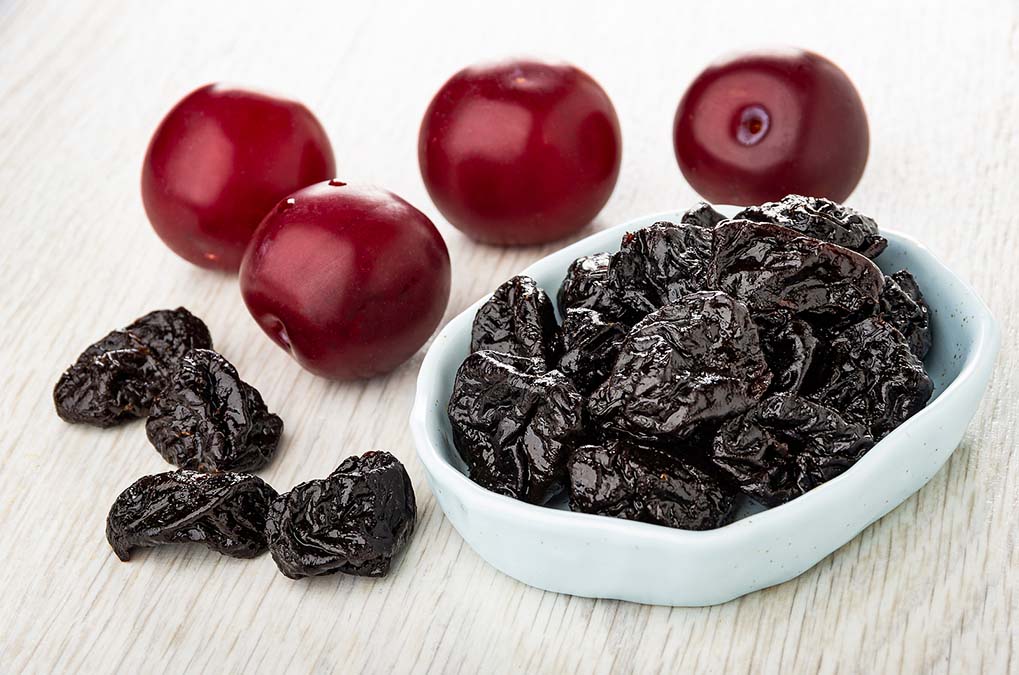 Repeated studies have revealed that this fruit drastically improves bone health in women.
Repeated studies have revealed that this fruit drastically improves bone health in women.
Mostly women have been studied in terms of bone health, as 2/3 of people suffering osteoporosis are women.
But how about men?
To address this gender inequality and critical research gap, a new study has just appeared in the Journal of Medicinal Food. It puts this fruit to the test for bone health in men.
Numerous studies have been performed on the relationship between prune consumption and bone health in women. In fact, most studies on bone health are performed on women, because their osteoporosis risk increases so much after menopause.
Generally, the existing studies show that the consumption of anything between 50 and 100 grams of prunes daily can increase bone mass and reduce the breakdown of bone.
Based on these studies, a research team led by San Diego State University recruited 66 men and assigned them to one of two groups: one that received 100 grams of prunes per day, and the other that received none. The subjects were all above 50 years old.
They acquired blood samples from all these men before the beginning of the study, and again after 3, 6, and 12 months while they were on the prune diet.
They also assessed participants’ bones at the beginning and after six and 12 months, using dual-energy X-ray absorptiometry and peripheral quantitative computed tomography.
The measurements showed only a modest benefit, with the mineral density of only the tibia improving in the prune group. They did not find any improvement in the mineral density of the spine, hip, and ulna (forearm bone).
But the markers in the blood that indicate that strong bones are being built increased substantially in the prune group during the study period.
This can mean either that the study should have continued for longer than 12 months to see real results in bone mineral density, or maybe the participants should have consumed slightly more prunes.
Regardless, the study does show that the consumption of 100 grams of daily prunes is beneficial for the bone health of men over the age of 50.
Maybe the strongest finding of this study is that it’s actually possible to treat osteoporosis naturally.

 Overcoming IBD
Overcoming IBD Multiple Sclerosis
Multiple Sclerosis Banishing Bronchitis
Banishing Bronchitis Gum Disease Gone
Gum Disease Gone Overcoming Onychomycosis
Overcoming Onychomycosis Neuropathy No More
Neuropathy No More The Prostate Protocol
The Prostate Protocol Brain Booster
Brain Booster
 Ironbound
Ironbound
 Solution for Shingles
Solution for Shingles
 The Bone Density Solution
The Bone Density Solution
 The Ultimate Healing Protocol
The Ultimate Healing Protocol
 The Parkinson's Protocol
The Parkinson's Protocol
 The Chronic Kidney Disease Solution
The Chronic Kidney Disease Solution
 Overthrowing Anxiety
Overthrowing Anxiety The Fatty Liver Solution
The Fatty Liver Solution The Hypothyroidism Solution
The Hypothyroidism Solution
 The End of Gout
The End of Gout The Blood Pressure Program
The Blood Pressure Program
 The Oxigized Cholesterol Strategy
The Oxigized Cholesterol Strategy
 Stop Snoring And Sleep Apnea Program
Stop Snoring And Sleep Apnea Program
 The Arthritis Strategy
The Arthritis Strategy The Vertigo & Dizziness Program
The Vertigo & Dizziness Program The 3-Step Diabetes Strategy
The 3-Step Diabetes Strategy Hemorrhoids Healing Protocol
Hemorrhoids Healing Protocol The Erectile Dysfunction Master
The Erectile Dysfunction Master Weight Loss Breeze
Weight Loss Breeze The IBS Program
The IBS Program The Insomnia Program
The Insomnia Program The Migraine and Headache Program
The Migraine and Headache Program The Neck Pain Solution
The Neck Pain Solution The Menopause Solution
The Menopause Solution The Ejaculation Master
The Ejaculation Master The TMJ Solution
The TMJ Solution The Acid Reflux Solution
The Acid Reflux Solution The Fibromyalgia Solution
The Fibromyalgia Solution The Psoriasis Strategy
The Psoriasis Strategy